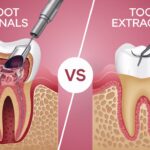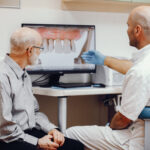Causes of Bad Breath: Tooth Decay Smell, Cavities, and More — Walk-In Dentist
Bad breath, also known as Halitosis, may be completely benign or it may be indicative of a deeper underlying disease. Bad breath and odor occur to everyone at some point in their lives — sometimes, the source may just be poor oral hygiene, but it can also be caused by issues like gum disease. It can be temporary or it can also be chronic. Causes of bad breath: tooth decay smell, cavities, and more — in this article, we’ll explore all the causes of halitosis and how to meet a walk-in dentist.
Causes of Bad Breath — Closest Emergency Dentist
As the name suggests, bad breath is a condition in which your breath smells pretty bad. It can be socially awkward and it can make people maintain a distance when you speak. In addition to the odor, bad breath is often accompanied by a bad taste in your mouth as well. If the bad taste is caused by food particles, you can simply brush and floss your teeth. But if the bad breath and taste are caused by an underlying condition, then they’ll persistent even after you brush. The following are some of the primary causes of bad breath and odor.
Poor Oral Hygiene
Proper oral hygiene includes regular brushing, flossing, rinsing your mouth, and going for deep cleaning appointments. If you have food particles stuck in your teeth due to poor oral hygiene, then bacteria may break down the food particles stuck between your teeth and release toxins that will create an unpleasant smell. Brushing and flossing regularly — and dental deep cleaning to remove the accumulated plaque and tartar — helps remove the food particles before they can decay. Bad breath may also occur if you wear dentures or other dental appliances and don’t clean them regularly.
Food and Beverages
You may have bad breath if you consume food and beverages with a strong odor like onions and garlic. Your stomach absorbs the oils from these food items during digestion and they pass into your bloodstream and lungs, which can make you exhale a foul odor for about 72 hours. As such, you can reduce bad breath by limiting your consumption of onions, garlic, coffee, and other such food and beverages with a strong smell.
Smoking
Cigarettes and cigars leave a terrible smell in your mouth and it also dries out your mouth, which leads to further bad breath.
Dryness
Dry mouth occurs in the lack of sufficient saliva, which is a cleansing agent that keeps your mouth clean. As such, if you don’t have enough saliva, your mouth doesn’t clean out all the food particles and bacteria, which leads to bad breath. You may have a problem with dryness if you have a salivary gland condition, if you sleep with your mouth open, or if you’re taking certain medicines.
Gum Disease
Gum disease occurs if you don’t go for regular dental deep cleaning appointments and if you have accumulated plaque and tartar in your mouth. This can lead to persistent bad breath for several reasons. Plaque and tartar lead to bacterial infection, which leads to the release of toxins and dental decay. Furthermore, gum disease also increases the pockets of space between your teeth and gums — food particles get stuck in these openings, which leads to bad breath and odor.
Throat Conditions
You may have bad breath if you have certain sinus or throat conditions like postnasal drainage, sinus infection, tonsil stones, or chronic bronchitis.
Other Diseases
Bad breath also occurs because of other diseases like diabetes, kidney disease, gastroesophageal reflux disorder, liver failure, and many others.
How to Prevent Bad Breaths? Emergency Dental Care
The following tips will help you avoid bad breath altogether:
- Brush your teeth at least twice every day.
- Floss daily and make sure you remove all the food particles stuck between your teeth.
- Rinse your mouth with an antimicrobial mouthwash to kill all bacteria.
- Scrub your tongue with a tongue scraper.
- Stay hydrated so you don’t get a dry mouth.
- Drink water after eating food to wash away the food particles.
- Stop smoking.
- Clean your dentures, mouth guards, and dental appliances thoroughly and regularly.
- Replace an old toothbrush every three months.
- Go for regular dental deep cleaning appointments.
How to Treat Bad Breaths? Dentist Open Today
In order to treat bad breath, the dentist will need to diagnose the root cause of bad breath and address that directly. For example, if your bad breath is caused by plaque accumulation, they’ll treat it with a dental deep cleaning procedure. During this treatment, the dentist will use a scaler to remove all of the accumulated plaque and they’ll reattach the gums to the teeth with a root planning procedure. If your bad breath is caused by a sinus infection or any other issue, the dentist will recommend the necessary treatment plan.
How to Find the Best Dentist?
The following are some tips on how to find the best dentist:
- Find the closest emergency dentist in Houston TX.
- Find an emergency dentist near me open on Saturdays so you can schedule an emergency dentist appointment if necessary.
- Emergency dentists who accept dental insurance and have a flexible payment plan.
- Dentists who use BPA-free fillings and products.
Schedule Dentist Appointment Today
URBN Dental is the best emergency dentist near me. We have some of the country’s finest dentists who examine your teeth and determine the root cause of bad breath before curating a treatment plan. For more information, please schedule a dentist appointment today.















